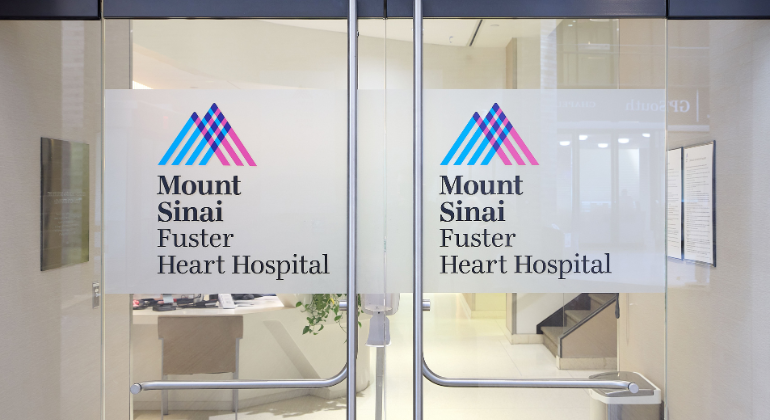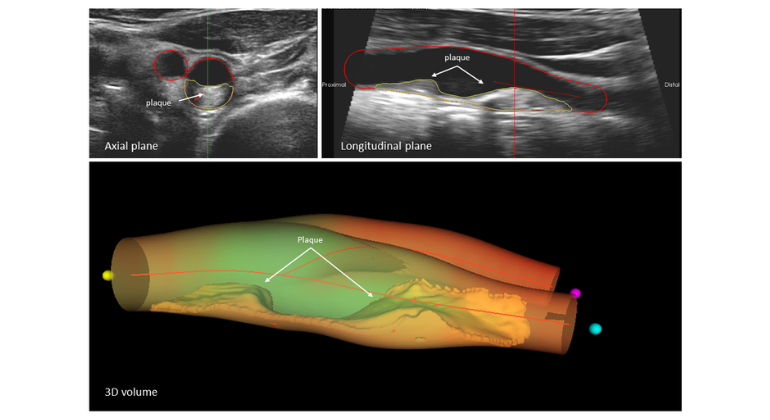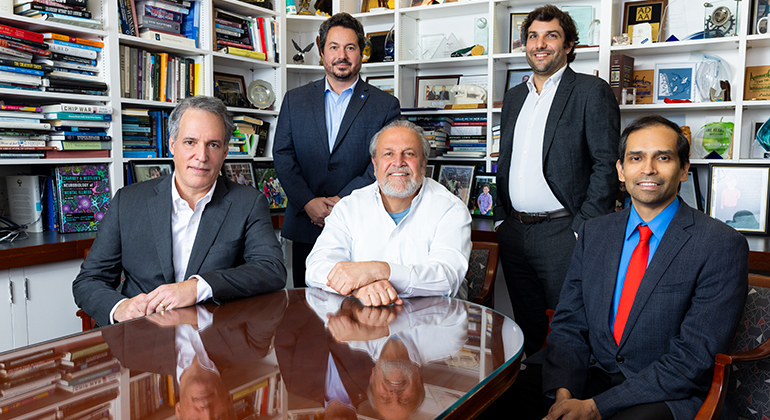Mount Sinai Heart Initiates Impact Study of Worksite-based Lifestyle Intervention to Reduce Cardiovascular Risk
World-renowned cardiologist Valentin Fuster, MD, PhD, Director of Mount Sinai Heart and Physician-in-Chief of The Mount Sinai Hospital, is undertaking a three-year study, known as the TANSNIP-PESA study, to determine whether a workplace-based lifestyle intervention, accompanied by imaging data, will lead to a reduction in the prevalence of cardiovascular (CV) disease risk factors related to lifestyle. The World Health Organization and the European Union have stressed the importance of implementing Worksite Health Promotion programs to encourage healthy lifestyle behaviors during and after work hours. Mount Sinai Heart is ranked No. 7 in the nation by U.S. News & World Report in its 2015 “Best Hospitals” issue.
“Cardiovascular disease is the leading cause of death worldwide and early prevention is important for health gains and for cost reduction. I fully expect that individual awareness of cardiovascular disease based on imaging, accompanied by a comprehensive three-year work-based lifestyle intervention, will lead to a reduction in the prevalence of CV risk factors related to lifestyle,” said Dr. Fuster.
The population for the TANSNIP-PESA consists of people 40 to 60 years old and who are employees from a Spanish corporation. Employees will be divided into two groups. One group will comprise employees with high imaging-defined CV risk and a second group will comprise those with low imaging-defined CV risk. In both groups, participants will be randomized to either receive the comprehensive three-year worksite lifestyle intervention or standard occupational health care.
Employees in the workplace-based lifestyle intervention program will receive 12 personalized lifestyle counseling sessions spread over the three-year period, a Fitbit personal fitness monitor to self-monitor physical activity, and an Ergotron sit-to-stand station. Data will be collected at baseline, at year one, at year two, and at year three. The primary outcome measure is the FUSTER-BEWAT score, a newly developed score, which consists of blood pressure, physical activity, sedentary behavior, body mass index, fruit and vegetable consumption and smoking. The researchers will also measure secondary outcomes such as changes in lifestyle, smoking, body weight, diet, vitality and quality of life, and risk factor profiles, as well as changes in blood biomarkers, and work-related outcomes such as work productivity and absenteeism. The researchers hypothesize that the level of compliance with the lifestyle intervention will be higher in the group with high imaging-defined CV risk, compared to those with low imaging-defined CV risk. They will also review the cost-effectiveness of the intervention, compared with standard care, from both the societal and employer’s perspective.
This study is the first in a series of four known as the TANSNIP (Trans-Atlantic Network to Study Stepwise Noninvasive imaging as a Tool for Cardiovascular Prognosis & Prevention) Program. The four studies are designed to understand atherosclerosis in different populations, at different levels of risk, and in different settings. The other TANSNIP studies include TANSNIP-H2H (heart to heart), which includes older patients and employs cutting-edge technology and cognitive dysfunction; TANSNIP–BioImage, which explores atherosclerosis progression in middle-aged people in Chicago and Florida; and TANSNIP-Genomics, which examines genomics, proteomics and metabolomics across the populations of the other three TANSNIP studies. TANSNIP seeks to develop lifestyle-changing tools based on non-invasive imaging results of subclinical atherosclerosis presence.
The TANSNIP-PESA project is an international initiative that is being conducted through partnerships with Centro Nacional de Investigaciones Cardiovasculares, the Icahn School of Medicine at Mount Sinai, the Framingham Heart Study, and the VU University Medical Center in Amsterdam.
The TANSNIP Program is funded by a $5 million grant from AstraZeneca.
About the Mount Sinai Health System
Mount Sinai Health System is one of the largest academic medical systems in the New York metro area, with 48,000 employees working across seven hospitals, more than 400 outpatient practices, more than 600 research and clinical labs, a school of nursing, and a leading school of medicine and graduate education. Mount Sinai advances health for all people, everywhere, by taking on the most complex health care challenges of our time—discovering and applying new scientific learning and knowledge; developing safer, more effective treatments; educating the next generation of medical leaders and innovators; and supporting local communities by delivering high-quality care to all who need it.
Through the integration of its hospitals, labs, and schools, Mount Sinai offers comprehensive health care solutions from birth through geriatrics, leveraging innovative approaches such as artificial intelligence and informatics while keeping patients’ medical and emotional needs at the center of all treatment. The Health System includes approximately 9,000 primary and specialty care physicians and 10 free-standing joint-venture centers throughout the five boroughs of New York City, Westchester, Long Island, and Florida. Hospitals within the System are consistently ranked by Newsweek’s® “The World’s Best Smart Hospitals, Best in State Hospitals, World Best Hospitals and Best Specialty Hospitals” and by U.S. News & World Report's® “Best Hospitals” and “Best Children’s Hospitals.” The Mount Sinai Hospital is on the U.S. News & World Report® “Best Hospitals” Honor Roll for 2025-2026.
For more information, visit https://www.mountsinai.org or find Mount Sinai on Facebook, Instagram, LinkedIn, X, and YouTube.

Valentin Fuster, MD, PhD, Receives Prestigious Award from City of Barcelona, Spain
Jan 23, 2023 View All Press Releases
Samin Sharma, MD, Named Director of the Mount Sinai Cardiovascular Clinical Institute
Nov 28, 2022 View All Press Releases






